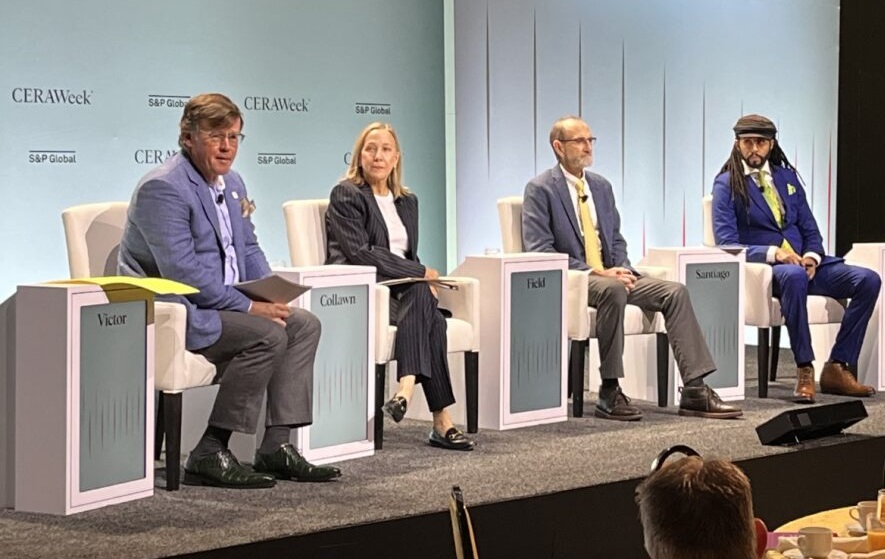In a testament to the values of the Commission on Accelerating Climate Action, the cochairs featured the Commission’s final report Forging Climate Solutions at CERAWeek, a leading energy conference. Held annually in Houston, CERAWeek gathers global leaders to discuss the challenges and opportunities for the future of energy, technology, and the climate.
Commission co-chair David Victor (University of California San Diego) moderated a strategic dialogue panel featuring co-chairs Mustafa Santiago Ali (National Wildlife Federation), Christopher Field (Stanford University), and Patricia Vincent-Collawn (PNW Resources), and joined by Julien Perez, the Strategy and Policy Vice President at the Oil and Gas Climate Initiative (OGCI).
The diverse panel, representing the private sector, frontline communities, government, and academia, provided an example of what the report calls the “fair bargain,” which details how these groups can work together to take meaningful action. Victor began the panel by describing the report’s whole-of-society approach built on the Commission’s diverse membership and bipartisanship in a time of political uncertainty. He then turned to each panelist to discuss key elements of the report relevant to the energy sector.
Field emphasized that the strategies and recommendations in the report show how to build and sustain a coalition across ideologies and withstanding elections. Perez acknowledged that confronting the climate crisis will require the energy sector to engage other disciplines and perspectives beyond engineers.
Vincent-Collawn discussed the importance of government streamlining siting and permitting processes at the local, state, and federal levels, while incorporating local community voices. [Streamlining permitting is a recommendation in the Commission's report.] Building on this point, Santiago Ali emphasized the need to build capacity within a company to engage with communities. The energy transition requires authentic collaborative partnerships built on trust and honest conversations to move forward equitably. Perez added an example of OGCI’s work facilitating learning across national oil and gas companies to better consider the local economy and capacity and interests of communities.
Afterwards, the panelists took audience questions. One attendee asked the panel what challenges the Commission overcame to put together this report. The cochairs highlighted the importance of spending time together and developing a shared vision. This helped build trust to manage differences in language and perception, the Commission’s greatest challenge. Ultimately, Victor emphasized that the report, and its signatories, show how industry, government, communities, and many other stakeholders can align to accelerate action.
In addition to the panel presentation, Field participated in a “Voice of Innovation” conversation with Atul Arya, Senior Vice President and Chief Energy Strategist at S&P Global Commodity Insights. The conversation also highlighted the Commission report, as well as Field’s research on climate impacts and adaptation.
CERAWeek offered an opportunity to share the climate report with the energy industry, a vital audience for accelerating climate action. The sessions challenged conference attendees to find ways to build meaningful and authentic relationships with communities and across sectors and provided concrete recommendations and examples on how to do it.
The Commission on Accelerating Climate Action will continue to host outreach events and activities through Summer 2024. For further insights and updates on the work, visit amacad.org/climate.
